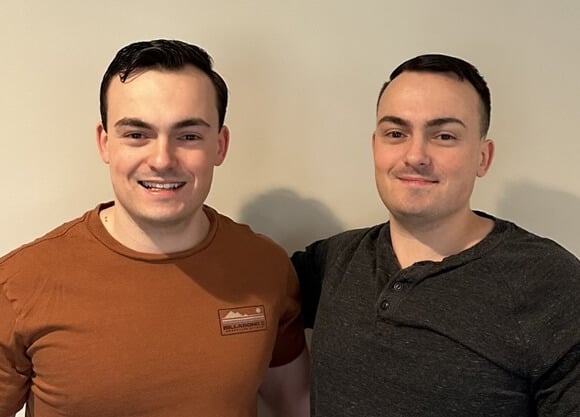
MS in Cybersecurity launches successful careers for twin brothers
April 21, 2023

April 21, 2023

Kyle DeGennaro, a software engineer II at Vertical Knowledge in Ohio, and Tyler DeGennaro, a data engineer II at Recorded Future in Massachusetts, both undertook Quinnipiac’s online, 30-credit MS in Cybersecurity as an accelerated combined degree, or 4+1 program.
Master’s program studies began in their senior year, while both were also completing a bachelor’s in computer science at the School of Computing and Engineering. They said the ability to apply some undergraduate credits toward their master’s added to the program’s many benefits.
“I always had an interest in cybersecurity, but the fact that I could start it early, and also cross-count credits for my senior year toward my master’s, really drew me to the program,” said Tyler DeGennaro. “If you look at most people who do their master’s who aren’t in a 4+1 program, they usually go back to school, and it takes them two to three years. The fact that I was able to start it my senior year and finish one year after, to me, just made a lot of sense.”
“I was attracted to it immediately,” added Kyle DeGennaro. “I was able to have nine credits in the master’s program count from my undergrad. And the cyber program was all online, so it was flexible. I think the way they have it structured works really well, even for people working full-time.”
New this fall, the program will also begin offering on-ground studies, noted Frederick Scholl, the university’s cybersecurity program director.
With a bachelor’s in computer science, both brothers were very technically qualified to enter Quinnipiac’s master’s in cybersecurity program, but applications from all backgrounds are also encouraged for those interested in this advanced degree, said Scholl.
“Those two students were very technical and very qualified. We also like to take other people who don’t have the in-depth technical backgrounds. If you want to do something in this field, you can. Your background’s not going to be an impediment to you, and we help you achieve that,” said Scholl.
Now in its fourth year, the program’s cutting-edge curriculum is officially validated by the National Security Agency (NSA) and Department of Homeland Security, and continually updated to stay current with evolving threats. Courses include topics such as cloud security, identity and access management, IoT security and data security, and network and OS security.
“When I first started the program, I thought cybersecurity was mainly technical. But through this program, it really opened my eyes that there are so many different individual spaces,” said Tyler DeGennaro. “At Recorded Future, the area that I focus on is data signals. I’m on the open web collection team, which is a new team they just formed. We consume data from the public internet, and we essentially evaluate it for risk.”
“Quinnipiac’s program really does give you a breadth of knowledge,” Kyle DeGennaro agreed. “I’m a software engineer working for a cybersecurity company — that’s just one small route you can take. Our company covers everything from commercial data to data intelligence for the government. If there’s data out on the internet, we’ll find a way to get it. My role is to write software that will go out in the public internet and extract data from these websites.”
With Quinnipiac’s reputation as a top university in the United States for successful career placement following graduation, focusing on career success is a critical component of its MS in Cybersecurity program, Scholl said.
“It’s really a practitioner degree, and so we help people find their way,” said Scholl. “As program director, I’m always looking out for opportunities for students, and I know the other faculty members in the program are, as well. Pretty much all the faculty members in the program are security practitioners, so they’re out in the real world, and they teach students not only the technology, but to some extent the art and science of putting it into practice. And part of that is finding a job.”
The master’s program also facilitates future entrepreneurs.
“A lot of the practitioners are entrepreneurs,” said Scholl. “Both the DeGennaros joined a start-up company, and they’re both working for companies that are tech companies looking to expand and grow. Not everyone has to do that; but I think that’s one of the traits that we try to emphasize here.”
Program alumni have gone on to many roles in cybersecurity, as well as chief-level roles responsible for technology in an organization, and even the program’s first student to work in the intelligence community in Washington, D.C.
“It’s a good destination career path, and it’s a stepping-stone career path for other things,” said Scholl.
Quinnipiac Today is your source for what's happening throughout #BobcatNation. Sign up for our weekly email newsletter to be among the first to know about news, events and members of our Bobcat family who are making a positive difference in our world.
Sign Up Now